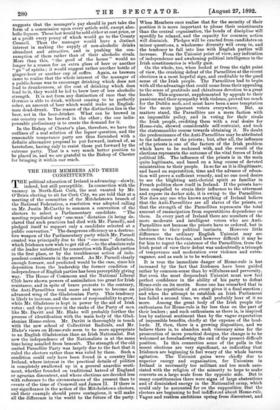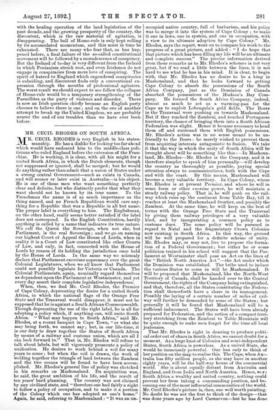THE IRISH MEMBERS AND 1 .1.11..EIR CONSTITUENTS.
THE political education of Ireland is advancing—slowly, indeed, but still perceptibly. In connection with the vacancy in North-East Cork, the seat vacated by Mr. O'Brien electing to sit for Cork City, we are told that at a meeting of the committee of the Mitchelstown branch of the National Federation, a resolution was adopted calling on Mr. Justin McCarthy to summon a convention of the electors to select a Parliamentary candidate. "The meeting repudiated any 'one-man' dictation (it being de- clared that such practices had died with Mr. Parnell), and pledged itself to support only a candidate selected at a public convention." The dangerous efficiency as a destruc- tive weapon of the Parliamentary party which Mr. Parnell created was principally due to this " one-man " dictation, which Irishmen now wish to get rid of,—to the absolute rule of the leader unfettered by connection with English parties in the first place, or by the troublesome action of inde- pendent constituents in the second. As Mr. Parnell clearly enough foresaw, and predicted would be the case, since his deposition from the leadership the former condition of independence of English parties has been perceptibly giving way. The House of Commons and the National Liberal Club have shown powers of assimilation too great for Irish resistance, and in spite of brave protests to the contrary, the Anti-Parnellites tend more and more to become an advanced wing of the Gladstonian Party. This tendency is likely to increase, and the sense of responsibility to grow, while Mr. Gladstone is kept in power by the aid of Irish votes ; and the presence in the ranks of the Party of men like Mr. Davitt and Mr. Blake will probably further the process of identification with the main body of the Glad- stonian Home-rulers. Mr. Devitt is thoroughly in touch with the new school of Collectivist Radicals, and Mr. Blake's views on Home-rule seem to be more appropriate to an English Gladstonian than an Irish Nationalist. But now the independence of the Nationalists is at the same time being assailed from beneath. The strength of the old united Parnellite Party was largely due to the fact that it ruled the electors rather than was ruled by them. Such a condition could only have been found in a country like Ireland, where interest in the practical details of politics is completely swallowed up in a general anarchic senti- ment, whether founded on traditional hatred of England or agrarian discontent, and where elections are decided less with reference to the circumstances of the present than to events of the time of Cromwell and James II. If there is any significance in the action of the Mitchelstown electors, and their example should prove contagious, it will make all the difference in the world to the future of the party. When Members once realise that for the security of their position it is more important to please their constituents than the central organisation, the bonds of discipline will speedily be relaxed, and the capacity for common action will diminish. Pledges will be exacted from candidates on minor questions, a wholesome diversity will creep in, and the tendency to fall into line with English parties will increase. From the Unionist point of view, any indication of independence and awakening political intelligence in the Irish constituencies is wholly gain. On the whole, too, when looked at from the right point of view, the crushing defeat of the Parnellites at the recent elections is a most hopeful sign, and creditable to the good. sense of the Irish people. The Parnellites had to begin with all the advantage that could come from their appealing to the sense of gratitude and chivalrous devotion to a great leader. This argument, supplemented by appeals to their passions and their sympathy with violence, proved too much for the Dublin mob, and must have been a sore temptation for the more ignorant voters everywhere. But, as matters stand, the Parnellites are a mere faction with an impossible policy, and in voting for their rivals the Irish people, crediting them with a real desire for Home-rule, showed considerable self-restraint, and, took the statesmanlike course towards obtaining it. No doubt the predominance of the Anti-Parnellites may be attributed to the influence of the priests ; but, after all, the influence of the priests is one of the factors of the Irish problem which have to be reckoned with, and the result of the elections represents the outcome of the vital forces of Irish political life. The influence of the priests is in the main quite legitimate, and based on a long course of devoted ministration to their people. Insofar as it is illegitimate, and based on superstition, time and the advance of educa- tion will prove a sufficient remedy, and no one need desire to see the blighting anti-clerical spirit so familiar in French politics show itself in Ireland. If the priests have been compelled to strain their influence to the uttermost and expose its darker side, it is owing to the Parnellites. Nor does any one who knows anything of Ireland believe that the Anti-Parnellites are all slaves of the priests, or that the strength of the Parnellites represents the total amount of emancipation from superstitious dependence on them. In every part of Ireland there are numbers of the more moderate and intelligent voters who are Anti- Parnellites not because the priests have so ordered, but in obedience to their political instincts. However little difference the ordinary English Unionist may see between the two factions, and however difficult it may be for him to regret the existence of the Parnellites, from the Irish point of view their defeat was undoubtedly a triumph of temperance and moderation over violence and extra- vagance, and as such is to be welcomed.
It is true the immediate danger of Home-rule is but increased by the fact that Irishmen have been guided rather by common-sense than by wilfulness and perversity. But even the most despondent Unionist must now feel perfect confidence in the ability of his party to defeat Home-rule on its merits. Some one has remarked that in politics the repetition of an event gives it a final sanction ; and when the attempt to establish an Irish Parliament has failed a second time, we shall probably hear of it no more. Among the great body of the Irish people the enthusiasm for Home-rule is far less than on the part of their leaders ; and such enthusiasm as there is, is inspired less by national sentiment than by the vague expectation of impossible benefits, chiefly at the expense of the land- lords. If, then, there is a growing disposition, and we believe there is, to abandon such visionary aims for the prosecution of more practical designs, the change is to be welcomed as foreshadowing the end of the present difficult position. In this connection some of the polls in the recent elections are very significant, as indicating that Irishmen are beginning to feel weary of the whole barren agitation. The Unionist gains were chiefly due to superior energy and organisation, for Unionism in Ireland is necessarily too militant and too much asso- ciated with the religion of the minority to hope to make converts on a large scale from the opposite side. But in many constituencies there were signs of large abstentions and of diminished energy in the Nationalist camp, which could only be accounted for on the supposition that the electors are beginning to feel indifferant about Home-rule. Vague and restless ambitions spring from discontent, and with the healing operation of the land legislation of the past decade, and the growing prosperity of the country, the discontent, which is the raw material of agitation, is disappearing. The ball of Home-rule is only rolling by its accumulated momentum, and this must in time be exhausted. There are many who fear that, as has hap- pened before, a final failure of the so-called constitutional movement will be followed by a recrudescence of conspiracy. But the Ireland of to-day is very different from the Ireland in which Fenianism struck root, and even Irishmen do not engage in conspiracies from mere love of conspiring. The spirit of hatred to England which engendered conspiracies is subsiding, and discontent finds only a conventional ex- pression through the mouths of professional agitators. The worst result we should expect to see follow the collapse of Home-rule would be a temporary strengthening of the Parnellites as the party of violence and disorder. There is now an Irish question chiefly because an English party chooses to believe there is one ; and on the eve of another attempt to break up the United Kingdom, we are probably nearer the end of our troubles than we have ever been before.



































 Previous page
Previous page